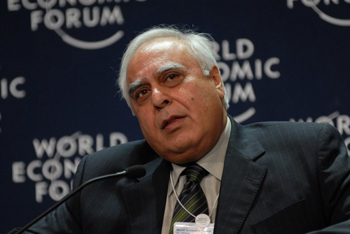 New Delhi, Nov 1: Accusing Narendra Modi of engaging in "politics of lies", Union Minister Kapil Sibal today challenged BJP's Prime Ministerial candidate to a debate as he stated that political discourse should move from individuals to issues affecting the country.
New Delhi, Nov 1: Accusing Narendra Modi of engaging in "politics of lies", Union Minister Kapil Sibal today challenged BJP's Prime Ministerial candidate to a debate as he stated that political discourse should move from individuals to issues affecting the country.
And, as BJP quickly responded to Sibal's challenge, saying Arun Jaitley was ready to debate him, the Union Minister said he would take on Jaitley when he also became a Prime Ministerial candidate.
He is challenging Modi to a debate as it was the Gujarat Chief Minister who was spreading lies against UPA, Sibal said.
Slamming Modi, whom he referred to as the "perennial opponent" (Nirantar Virodhi) without, however, taking his name, Sibal accused him of spreading untruths about UPA.
He sought to puncture the BJP's leader's repeated refrain that Congress had destroyed the country.
"I am sorry that the issues which should be discussed are not being discussed... They (BJP) do not have issues. Hence they only talk about individuals... One person can neither make nor is going to make the future of the country.
"The country's future is decided by policies and not allegations. Unfortunately, for some days, such an atmosphere has been made that the talk is more about individuals than about issues," Sibal said.
Releasing a bunch of papers to show that UPA had performed better than the BJP-led NDA government in terms of GDP growth, increasing per capita income, bringing FDI into the country and so on, Sibal said that if the above meant destroying India, then BJP should remain permanently in opposition so that the country may progress.
Wondering why Modi did not address press conferences, Sibal alleged the Gujarat Chief Minister wanted a controlled audience so that he can get away with his untruths.
He also ridiculed the BJP leader over his "gaffes" regarding history during his Patna rally, saying, "He does not know that Alexander never reached the Ganges, that Chandragupta Maurya did not belong to Gupta dynasty and that Taxila is in Pakistan and not in Patna. How can somebody, who does not know history, create history. Surprised which history book he read."
Sibal also attacked Modi over BJP's alliance with Shiv Sena to question his affection for people from Bihar.
"If he has so much affection for people from Bihar, he should snap ties with Shiv Sena because they do not want Biharis to live in Maharashtra," Sibal said.





Comments
Add new comment